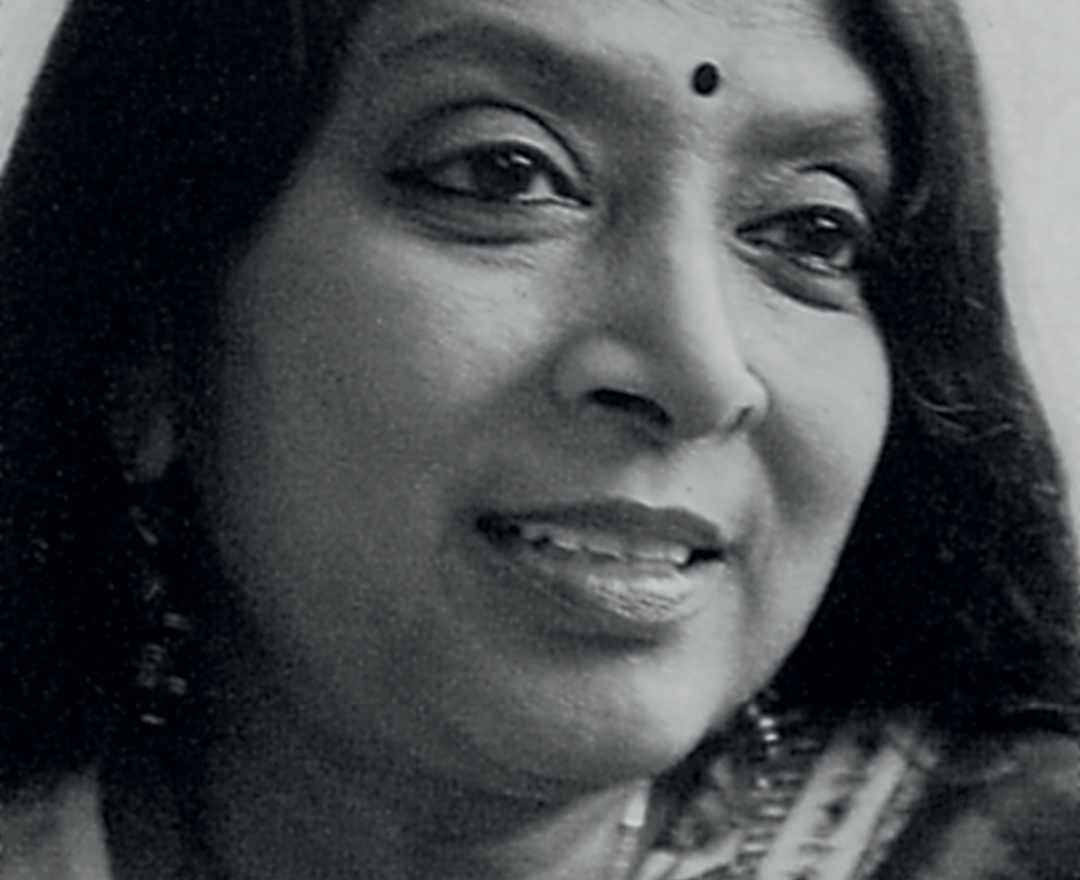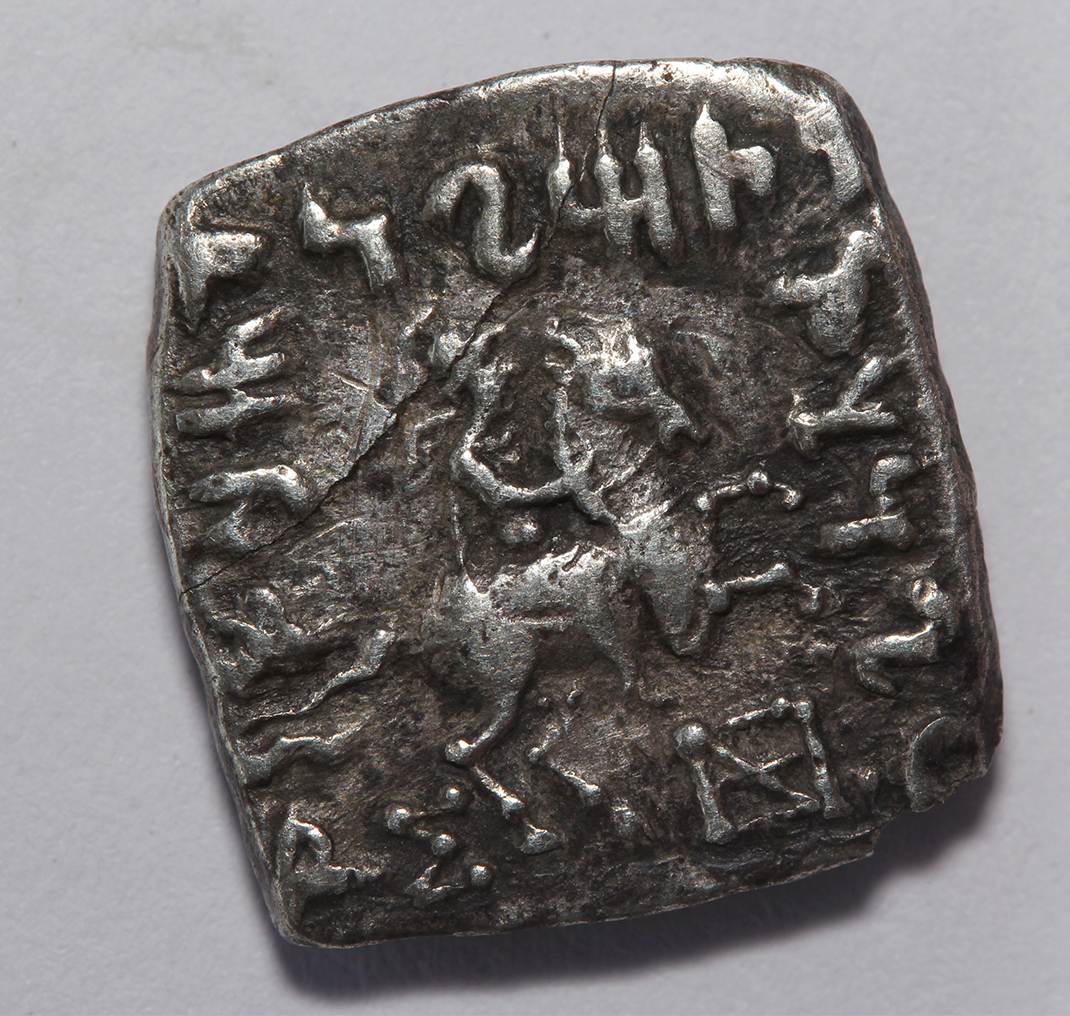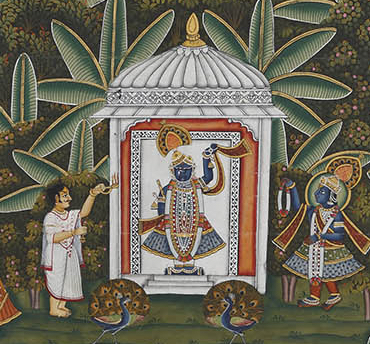
Kaziranga National Park, home of the one-horned rhino, is in Nagaon district, where the artist grew up. Image by Satish Krishnamurthy, CC BY 2.0 via Wikimedia Commons
A nine-year-old walks into the hilly woods outside his home in Guwahati. As he wanders deeper, the sights and noises of the city are gradually replaced with the whispering green of the wilderness. He exhales. He sets down the grief he’s been holding in all day. The grief of losing, first, his mother and, then, his home far away in Nagaon. He talks and the trees listen. He is home.

Assam, photograph by Chandan Bez Baruah
Chandan Bez Baruah has always felt umbilically connected to the land of his birth. Not the abstract or political idea of ‘Assam’, but the literal hills, valleys and forests that make up the state. Like they once witnessed his pain, he now bears witness to theirs through his art.

Sutradhar in Bhaona, Diganta Talukdar Wikipedia Creative Commons, CC BY-SA 3.0
“I was born in Nagaon, a cultural hub of Assam” the artist said in a conversation with Sarmaya. “My parents were very involved in Bhaona, a performance tradition that brings together art, dance and drama to tell mythological stories.” Chandan’s father noticed that his son showed a natural aptitude for art and craft. So he was enrolled in art school, first at Nagaon and then in Guwahati, where they moved after his mother died.

Chandan at his studio, image courtesy of the artist
It was in Guwahati that Chandan encountered the medium that would absorb him for years to come. His art teacher—whom he credits, along with his father, for setting him on this path—had a Masters in printmaking from MS University Baroda. Watching him make woodcuts, a teenaged Chandan became fascinated with the technique. When he got admission into the Government College of Art and Craft, Guwahati, he enrolled in its printmaking department.
There Chandan studied under such teachers as Ajit Seal and Dilip Tamuly, who helped to sharpen his technique and bring new dimensions to his vision. Having learned all he could of the craft in Assam, he went to West Bengal to get an MFA in printmaking from Kala Bhavana, the fine arts centre at Visva-Bharati University, Shantiniketan. It was a rich experience that exposed him to contemporary art and literature from the around the world.
View this post on Instagram
Today, Chandan is most prolific in woodcut printing and lithography, mediums are uniquely suited to capturing the nostalgia that fuels his art. He had a natural ease working with wood, which he credits to a childhood spent in nature. Still, he says, “Printmaking takes passion and patience. Every step of the process is important. You must be very sensitive throughout, from image-making to printing.”
A Chandan Bez Baruah woodcut print starts as a photograph. Referring to an image he made, he carves out its particulars onto a woodblock, aiming for a result that is photo-realistic but not flat. Instead, this new rebirth of the image is so riven through with the artist’s memories, it feels familiar in some universal way. He doesn’t just want you to look, he wants you to feel.
The idea he is currently feeling his way through is the fond and fractured relationship between humans and nature. Chandan has made another move away from his homeland, Assam—he now lives and works in Delhi. Having wandered far from the forests of his childhood, he looks back at them with love for what they gave him and rage for what’s being taken from them—and us.
The result is the series, If A Tree Falls (Somewhere in Northeast India), which consists of landscapes. Chandan believes, “Mostly my landscapes are silent without people. But they speak loudly in silence. Landscapes let artists to go to the heart of truth.” These moody, twilit vistas are, on the one hand, cherished glimpses of a land remembered with love. On the other, they are incriminating records of human encroachment into wild places.
“These landscape are testaments to the silent lands that have witnessed and endured so much in Assam… all knowing, but voiceless.” Chandan takes us into the habitats of the marginalised, whether it’s rural Indians or creatures of the wild. And he shows us that these habitats have themselves been marginalised, eviscerated by urbanisation, rampant commercialisation and other, more insidious factors. “Immigration, marginalised histories and authoritarian politics are all environmental issues.”
Chandan’s art draws parallels between the loss of diversity in nature and of plurality in politics. It laments the commercial tea gardens and orange orchards that have denuded Assam’s hills. It regards as malignant the signs of development, like paved roads, electrical wires and concrete houses.

From ‘If A Tree Falls (Somewhere in Northeast India)’, woodcut print from the Sarmaya collection
Three woodcut prints from the Somewhere in Northeast India series are part of the Sarmaya collection. One of them (see above) was part of our 2022 exhibition, Echoes of the Land – Art bears witness to a changing planet. Four panels make up the composite view of a shadowy path leading into a dark wooded area. Chandan says this is a common enough sight in Northeast India…“but very special to me. It brings back memories of sunshine flickering through the leaves of the trees and throwing shadows on the road.” Through this hushed scene runs a paved road that invites into the woods all the chaos and inequities of modern Indian society.

From ‘If A Tree Falls (Somewhere in Northeast India)’, woodcut print from the Sarmaya collection
In another work, the signs of intrusion are much more subtle. We see trees and a forest floor on which are scattered a few tea leaves. This, Chandan says, is where the tea garden ends and the jungle begins. The artist creates blank areas of darkness in this scene to provoke us into imagining what this landscape might look like in a few years. Will the trees still stand? Will the tea garden creep further? Will the forest still be here?

From ‘If A Tree Falls (Somewhere in Northeast India)’, woodcut print from the Sarmaya collection
In what seems like a zoomed-out perspective on the same image, we see a little more of the jungle, the tea garden and a meandering clay path. Chandan says, “There was no human figure in this image but in the print, there is a perceptible presence of tea-garden workers nearby.” The viewer is invited to enter this landscape, enjoy the sunshine filtering through the leaves overhead and sense the proximity of all those who toil in Assam’s famed tea gardens.
What inspires the title and the politics of this series is a question: If a tree falls in the middle of a forest and there’s no one to hear it, does it make a sound? This philosophical enquiry pushes us to consider the hidden world of the unseen, the unheard, the unperceived, the unaccounted-for. The vagueness of the Somewhere in the title is an indictment of the way in which mainstream culture in India invisibilises the Northeast and collapses all its identities with one careless geographical label.
The title is a declaration of solidarity with another invisible world—that of the falling trees, the vanishing forests, the unquiet hills. He says, “I can hear their screaming and the sound of the silence.” Chandan Bez Baruah’s landscapes urge us to do what he did as a child so many years ago. To walk into the woods and learn to listen.



